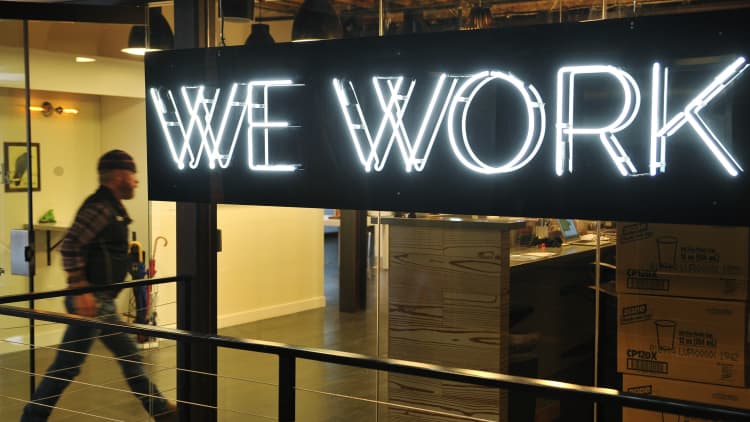
WeWork released its much-anticipated IPO prospectus on Wednesday, revealing a $900 million loss in six months as the workspace rental company lined up to join a flurry of tech companies going public in 2019.
WeWork, which rebranded to the We Company, is widely expected to go public as soon as next month. It was recently valued at $47 billion after SoftBank, the company's biggest backer, invested an additional $2 billion in January.
In the filing, the company reported revenues of $1.54 billion and a net loss of more than $900 million for the first six months of 2019. By comparison, another tech titan that went public this year, Uber, had a loss of $5 billion in the second quarter, largely due to stock based compensation from the IPO.
WeWork also reported that it had 527,000 members as of June 30, an increase of more than 90% from the year before.
It will trade under the ticker WE. J.P. Morgan Chase and Goldman Sachs are the main underwriters for the IPO.
WeWork, which rents out co-working spaces to start-ups, freelancers and enterprises, has to plunge cash into real estate in some of the most expensive markets and makes money back over time as companies and individuals pay their rent, or membership. The company reported long-term lease obligations of $17.9 billion in the filing.
When not discounted for accounting purposes, the future lease payment obligations were $47.2 billion as of June 30. The average length of an initial term of a lease in the U.S. is 15 years, according to the prospectus.
WeWork has 528 locations, up from 485 at the end of the first quarter of 2019, and said it plans to open 169 new locations. The company said 50% of its memberships are based outside the U.S. and that enterprise customers, which made up 40% of its memberships, are its fastest growing membership type.
"We have grown significantly since our inception," the company said in the filing. "Our membership base has grown by over 100% every year since 2014. It took us more than seven years to achieve $1 billion of run-rate revenue, but only one additional year to reach $2 billion of run-rate revenue and just six months to reach $3 billion of run-rate revenue."
The company also confirmed in the filing that it plans to raise up to $6 billion in debt that it expects to close along with the IPO.
According to the prospectus, WeWork's biggest shareholders are the WE Holdings company and entities of Benchmark, J.P. Morgan and SoftBank. The WE Holdings company is controlled by WeWork CEO Adam Neumann.
For the first six months of 2019, 56% of WeWork's revenue came from the United States with the rest generated internationally, according to the prospectus.
The We Company filed confidentially for an IPO in April. The filing didn't include financial specifics, but in its first-quarter business update in May, the company said revenue more than doubled to $728.3 million, helped by expansion into international markets and growing memberships.
In an effort to sway investors, the company has tried to differentiate its losses from money-losing ride-hailing companies like Uber and Lyft, which both went public earlier this year. CFO Artie Minson told CNBC's Deirdre Bosa in May that investors should view WeWork's losses as "investments," adding that renting out work space is a "proven business model."
The company has been expanding beyond co-working spaces and into new markets. It has launched communal housing complexes under its WeLive business, as well as early education schools called WeGrow.



